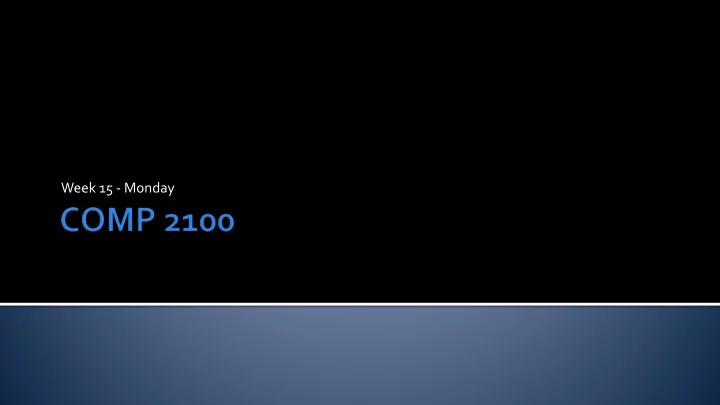

Week 15 - Monday
What did we talk about last time? Timsort Tries
Lab hours Wednesdays at 5 p.m. in The Point 113 Saturdays at noon in The Point 113 CS Club Tuesdays at 5 p.m. in The Point 113 (or next door in The Point 112) Last meeting of the semester!
Roughly half short answer questions Roughly half programming Designed to take 80 minutes (about 50% longer than the previous exams) But, you will have the full 105 minute time period The focus will be on the second half of the semester Look for things that were not covered on previous exams
Programming model Java OOP Interfaces Exceptions Java Collections Framework
Big Oh Notation Formal definition: f ( n ) is O ( g ( n )) if and only if ▪ f ( n ) ≤ c ∙ g ( n ) for all n > N ▪ for some positive real numbers c and N Worst-case, asymptotic, upper bound of running time Ignore lower-order terms and constants Big Omega and Big Theta Abstract Data Types Array-backed list
Stacks FILO data structure Operations: push, pop, top, empty Dynamic array implementation Queues FIFO data structure Operations: enqueue, dequeue, front, empty Circular (dynamic) array implementation JCF implementations: Deque<T> interface ArrayDeque<T> LinkedList<T>
Linked lists Performance issues Single vs. double Insert, delete, find times Special lists Circular Skip Self-organizing Linked list implementation of stacks Linked list implementation of queues
What’s the running time of the following code? int count = 0; for(int i = 1; i <= n; i++) for(int j = 1; j <= n; j++) for(int k = 1; k <= n; k += j) count++;
public class ArrayList { private String[] array = new String[10]; private int size = 0; … } Complete the following a method to insert a value in an arbitrary index in the list. You may have to resize the list if it doesn't have enough space. public void insert(String value, int index)
public class Tree { public class List { private static class Node private static class { Node { public String key; public String value; public Node next; public Node left; } public Node right; } private Node head = private Node root = null; null; … … } }
Write a method in the List class that will remove every other node (the nodes with even indexes) from a linked list public void removeAlternateNodes()
Write a method that takes a binary search tree and returns an ordered linked list Write the method in the Tree class Assume you are given a linked list with an add() method that can add to the front of the list Hint: Use a reverse inorder traversal Recursive method: private static void toList(List list, Node node) Proxy method: public List toList() { List list = new List(); toList(list, root); return list; }
Review up to Exam 2 Recursion Binary trees 2-3 and red-black trees Hash tables Graph basics Review Chapters 3 and 4
Bring a question to class Wednesday! Any question about any material in the course Keep working on Project 4 Due Friday Study for final exam Wednesday 12/5/2018 from 8:00-9:45 a.m.
Recommend
More recommend